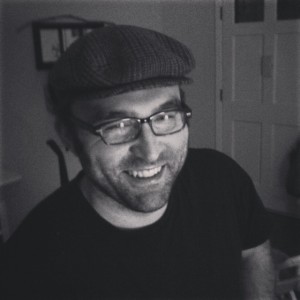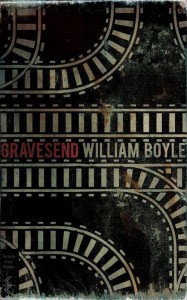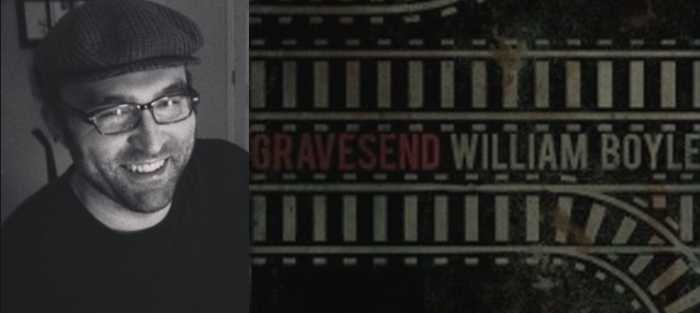 William Boyle is from Brooklyn. His first novel, Gravesend—out this month on Broken River Books—tells a heartbroken story of the neighborhood that shaped him. I know Bill from way back, and I’m sure he won’t object if I say Gravesend is firmly in the tradition of American noir: this is a novel where shots are fired, bodies are buried, and characters are caught in a web of rage and regret that will twist the reader up inside. A few modern masters of the genre—among them Megan Abbott, John Brandon, Tom Franklin, Ace Atkins, and Richard Lange—have already praised Gravesend for its plot, its rhythms, and its poignance.
William Boyle is from Brooklyn. His first novel, Gravesend—out this month on Broken River Books—tells a heartbroken story of the neighborhood that shaped him. I know Bill from way back, and I’m sure he won’t object if I say Gravesend is firmly in the tradition of American noir: this is a novel where shots are fired, bodies are buried, and characters are caught in a web of rage and regret that will twist the reader up inside. A few modern masters of the genre—among them Megan Abbott, John Brandon, Tom Franklin, Ace Atkins, and Richard Lange—have already praised Gravesend for its plot, its rhythms, and its poignance.
Like all the best crime writers, Boyle is both a masterful storyteller and a powerful stylist. He has an eye for the strange, ramshackle variety of Brooklyn: “The firing range was in a warehouse next to an abandoned textile company and right across from a Russian supper club. From the outside it looked like the kind of place where snuff movies got made.” He has an ear for the local patois: “I’m gonna go what, deaf?”; “It’s a disrespect.” He has a nose for the pungent details that make up his novel’s world: an old man’s house that smells like dirty sponges, a young man who stinks of “ten different kinds of shitty cologne,” a car that smells “vaguely of honey-roasted peanuts and piss.” He has a sense of humor and a sense of place. Most of all, though, he has the true novelist’s true feeling for his characters.
Boyle’s writing has appeared or is forthcoming in Mississippi Noir (Akashic Books), L.A. Review of Books, Salon, Needle: A Magazine of Noir, The Rumpus, Hobart, and other magazines and journals. He holds a B.A. and an M.A. from the State University of New York at New Paltz and an M.F.A. from the University of Mississippi, where he now teaches.
It would be gratifying to say this interview took place over a few cold drinks on the porch of City Grocery in downtown Oxford or on a boardwalk bench at Coney Island. But a series of e-mails more than sufficed.
Interview:
Alex Shakespeare: There are a lot of stories in Gravesend, a lot of characters: Ray Boy Calabrese, Conway D’Innocenzio, Eugene and Sweat, Alessandra Biagini. Did you know from the first you were writing a novel, or did you begin with one or two strands and then start combing the wool from there?
William Boyle: It was always going to be a novel, but my original plan was to switch back and forth between 2010 and 1994. In 2010, we would’ve still been with Conway in his pursuit of Ray Boy and that would’ve accounted for the bulk of the present action. The parts in 1994—which, at the time, I thought of as the main story—would’ve alternated between Duncan (Conway’s brother) and Ray Boy, and we would’ve focused on the events leading up to Duncan’s death. I realized pretty quickly that this wasn’t working and that already knowing what happened to Duncan in 1994 totally squashed the tension. It also felt too narrow. I wanted something that allowed me to focus more on character and less on the revenge story as I’d initially imagined it. I’d written the first chapter at that point, and I was stuck. I remember sitting at the coffee shop in town one morning with no idea how to correct the course of the book and then Alessandra showed up and saved me. A couple of days later, Eugene shouldered his way into the story and brought Sweat with him. They all kind of appeared fully formed, and I knew their roles before I even started outlining their parts. I had a realization that I needed the book to play out more like a Robert Altman film with all of these characters in moments of crisis swirling around each other, that the story didn’t belong to Conway and Ray Boy, that it belonged to the neighborhood.
Could you say something more about the character of Alessandra Biagini? I ask because I think I’m a little bit in love with her.
She’s the character I feel closest to. And, to me, she’s the main character, even though the book focuses so heavily on Conway and Ray Boy. Everything centers on her return to the neighborhood.
It wasn’t that way at first, as I said. When Alessandra showed up she sort of took over. My early notes indicate a different story arc for her, but she made herself pretty fully in my mind by the time I was done with the book’s second chapter (her first). I knew I didn’t want her story to be predictable. I wanted her to be twisty and complicated.
The name Alessandra comes from a girl I went to grade school with. And her last name, Biagini, comes from another girl I went to grade school with. The character isn’t based on either of them—I haven’t seen or heard anything about them since I was twelve or thirteen—but the names gave me some connection that I needed to the neighborhood. And it was easy for me to give some of the things I think and say about Brooklyn to Alessandra since we have certain things in common—moving away, not coming home after college, feeling the sadness of the place more intensely.
You’ve been living in Oxford for half a decade now. You wrote Gravesend there, and a good number of stories, which, with a couple exceptions, are all set in the boroughs. After such a long sojourn in the South, have you found yourself thinking differently about Brooklyn?
 I have. It’s strange to be away from the city ten, sometimes eleven, months out of the year now. I think, ultimately, it’s been really good for my writing. Even though I get back often (my family is still there), Brooklyn is more of an inscape for me these days; it’s constantly being remade in my imagination. I’m caught up in the mythology of it, as much as I am in the realities of existing there. The last time I lived in the city was 2006-2008 in the Bronx, so I find myself disconnected from certain things. I don’t know the city that so many of my friends who have moved there in the last few years know.
I have. It’s strange to be away from the city ten, sometimes eleven, months out of the year now. I think, ultimately, it’s been really good for my writing. Even though I get back often (my family is still there), Brooklyn is more of an inscape for me these days; it’s constantly being remade in my imagination. I’m caught up in the mythology of it, as much as I am in the realities of existing there. The last time I lived in the city was 2006-2008 in the Bronx, so I find myself disconnected from certain things. I don’t know the city that so many of my friends who have moved there in the last few years know.
One thing getting away has done is to give me some perspective. I knew when I came to Oxford that I wanted to write about Brooklyn the way Larry Brown had written about Oxford. There are a lot of Brooklyn writers I love, writers who have an incredible sense of place, but there was something so much more immediate to me in the work of writers like Larry Brown and Willy Vlautin, and I wanted to make my Brooklyn the way they’d made their places.
I remember picking up Brown’s Big Bad Love when I was living in Austin in early 2002—my first time away from New York—and I felt that connection immediately, even though I’d never been to Mississippi. It’s like Bukowski said in that letter to John Martin: “[…] what hurts is the steadily diminishing humanity of those fighting to hold jobs they don’t want but fear the alternative worse. People simply empty out.” That’s why Brown loved Bukowski, and that’s why I love Brown, Bukowski, and Vlautin. And I didn’t really see anyone writing about the Brooklyn people I knew like that.
In my introduction, I make kind of a fuss about calling Gravesend a noir novel. I guess it’s because so many novels I admire (I’m thinking of Malamud’s The Assistant, for one) aren’t genre novels but have elements of noir. And I’ve always wanted to ask your opinion on this: how much do genre distinctions matter in the end? Do you think about these distinctions while you’re writing, or what?
Part of the reason I love American movies from the ’70s so much is because the lines between genres are shattered. John Cassavetes and Robert Altman, who had a big influence on the way I built this book, made movies that often featured crimes but were really just character studies. I love that total dismissal of genre.
I don’t really think about it when I’m writing, but I’m definitely working under the sway of certain writers. I’m always thinking about the way Elmore Leonard made things. Gravesend is heavily dosed with the influence of Richard Price, Megan Abbott, Mary Miller, and George Pelecanos. So, in that way, I have my exemplary models and many of them are crime writers (and I’d call myself a crime writer), but I’m really concerned with how they create characters, how their plots move, and the rhythms of their prose.
Knowing how much film and music mean to you, I wanted to ask what it is the novel allows you. Money and melody aside, what is it we get from novels that we can’t get from stories told through cinematography and song?
Man, that’s a good question, and it’s something I think about a lot. I’m not a musician and I’m not a filmmaker (though I sometimes wish I was), so fiction is the only way I know to tell stories and the novel is my preferred form because, as much as I love tightness and economy, I also love being able to stretch my legs out. But as someone who is constantly consuming films and albums and books, I’d have to say it’s just more of a feeling: I live inside books the way I don’t live inside movies or albums, even favorites like Badlands and McCabe & Mrs. Miller or In the Aeroplane Over the Sea and Magnolia Electric Co. Or maybe it’s just a different kind of existence within the work. I don’t think watching films or listening to music is passive, it’s not that. The best books work their way into your blood in a way that’s so full, so mystical. I just read Willy Vlautin’s newest novel, The Free, and it was my life for the two days I was reading. It’s the same with other favorites – Ironweed, Jesus’ Son, The Easter Parade, The Death of Jim Loney, too many more to name. These books just hammer their rhythms into me, and I’m creating things in my mind even as a world is being presented to me. That’s how I feel when I’m writing too, like I’m inside of something big, like I’m tiling a world into place.
Further Links and Resources:
- To take a look at more of Boyle’s reviews, short stories, and music writing, you can visit his website.
- Read an excerpt of William Boyle’s Gravesend at Vol. 1 Brooklyn.
- Read Boyle’s essay on Songs: Ohia’s Magnolia Electric Co. at The Rumpus.
- Learn more about Gravesend and Broken River Books.






